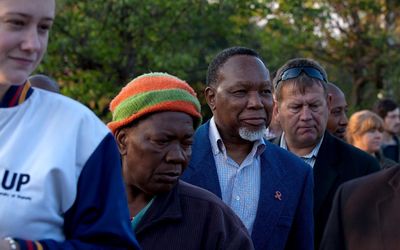Voting begins in South Africa
by Staff Writers,
2014-05-07 11:06:32.0
DEPUTY President Kgalema Motlanthe, Democratic Alliance (DA) leader Helen Zille, Agang SA leader Mamphela Ramphele and Economic Freedom Fighters leader Julius Malema were among the first politicians to vote on Wednesday morning.
The Electoral Commission of South Africa (IEC) said 25.3-million South Africans had registered to vote in the country’s fifth democratic national election, taking place just days after the 20th anniversary of the first democratic election on April 27 1994. About 31-million South Africans are eligible to vote, given their age.
Mr Motlanthe said he had high hopes for South Africa’s future under the next government administration.
He urged South Africans to exercise their vote as they were "spoilt for choice", with 29 political parties contesting for power.
"I’m optimistic that we will get to a point where our country will be governed efficiently with accountability and transparency. That is what the constitution enjoins us to do," Mr Motlanthe said.
Ms Zille, voting in Rondebosch, Cape Town, looked up and grinned as she pushed her provincial and national ballot papers into the two boxes positioned in the centre of the room.
Earlier speaking to journalists outside the venue, Ms Zille said the 2014 elections were extremely important, but the DA was also looking ahead to the next election and the one thereafter.
"The election is a platform to be able to change government peacefully," Ms Zille said.
Asked how she thought her party might do in the polls, she said: "We will see at the end of the day. I don’t like to speculate. Our goal in this election is to do better than in the last one."
Zille is set to fly to Port Elizabeth where she said she was "expecting a big improvement" in the DA’s performance in that province.
Ms Ramphele, who graciously accepted a bouquet of proteas wrapped in green cellophane from a fellow voter, said she was "very proud of being part of the process to raise the bar on political discourse in South Africa".
Voting in Seapoint, Cape Town, Ms Ramphele reminisced about voting in Boston in the US 20 years ago, when she was there on sabbatical.
"When you have a first experience — it doesn’t matter what it is and we won’t go too far into that — you always are emotional," she said.
"I wept the whole way through and wept in the evening when we saw the results."
She said she was now filled with joy because the country had been given enough time to learn to be a mature democracy.
"I am very proud of being part of the process to raise the bar on political discourse in South Africa," she said, her voice almost drowned out by the cries of seagulls on the roof.
Ms Ramphele gave a last wave before she was led off by her aide and bodyguard.
She was expected to make her way to Langa, Philippi and Muizenberg later on Wednesday morning and fly to Johannesburg in the afternoon to meet with residents of Bekkersdal.
Mr Malema arrived at the Mponegele Primary School in Seshego, Limpopo, with his grandmother, Sara Malema two hours after the station opened.
Earlier, EFF and African National Congress (ANC) supporters had a verbal altercation after ANC members set up a tent and distributed T-shirts bearing the face of President Jacob Zuma.
EFF members accused the ANC of lobbying for votes at the voting station. Police and IEC officials intervened and the matter was resolved.
EFF member Jossey Buthane said the IEC was not properly enforcing its own regulations. Canvassing is not allowed near election stations.
Some analysts in Limpopo believe the EFF could take seats currently occupied by other opposition parties in the provincial legislature.
Mr Malema was head of the ANC Youth League until he was expelled from the ANC.
Despite unrest at Bekkersdal on the West Rand, where police nyalas and military vehicles lined the street on Wednesday morning after protestors burned down an IEC tent on Tuesday, and at Gugulethu on the East Rand, where a community policing forum and Transnet was also burned down on Tuesday, most polling was quiet.
Mining areas along the North West’s platinum belt, the scene of the killing of 34 striking miners in 2012, were calm.
According to reports, some voting stations reportedly suffered logistical setbacks, delaying voting for a number of South Africans including Minister of Home Affairs Naledi Pandor.
With Sapa

Deputy President Kgalema Motlanthe casting his vote at the Colbyn polling station, Pretoria. Picture: GCIS
DEPUTY President Kgalema Motlanthe, Democratic Alliance (DA) leader Helen Zille, Agang SA leader Mamphela Ramphele and Economic Freedom Fighters leader Julius Malema were among the first politicians to vote on Wednesday morning.
The Electoral Commission of South Africa (IEC) said 25.3-million South Africans had registered to vote in the country’s fifth democratic national election, taking place just days after the 20th anniversary of the first democratic election on April 27 1994. About 31-million South Africans are eligible to vote, given their age.
Mr Motlanthe said he had high hopes for South Africa’s future under the next government administration.
He urged South Africans to exercise their vote as they were "spoilt for choice", with 29 political parties contesting for power.
"I’m optimistic that we will get to a point where our country will be governed efficiently with accountability and transparency. That is what the constitution enjoins us to do," Mr Motlanthe said.
Ms Zille, voting in Rondebosch, Cape Town, looked up and grinned as she pushed her provincial and national ballot papers into the two boxes positioned in the centre of the room.
Earlier speaking to journalists outside the venue, Ms Zille said the 2014 elections were extremely important, but the DA was also looking ahead to the next election and the one thereafter.
"The election is a platform to be able to change government peacefully," Ms Zille said.
Asked how she thought her party might do in the polls, she said: "We will see at the end of the day. I don’t like to speculate. Our goal in this election is to do better than in the last one."
Zille is set to fly to Port Elizabeth where she said she was "expecting a big improvement" in the DA’s performance in that province.
Ms Ramphele, who graciously accepted a bouquet of proteas wrapped in green cellophane from a fellow voter, said she was "very proud of being part of the process to raise the bar on political discourse in South Africa".
Voting in Seapoint, Cape Town, Ms Ramphele reminisced about voting in Boston in the US 20 years ago, when she was there on sabbatical.
"When you have a first experience — it doesn’t matter what it is and we won’t go too far into that — you always are emotional," she said.
"I wept the whole way through and wept in the evening when we saw the results."
She said she was now filled with joy because the country had been given enough time to learn to be a mature democracy.
"I am very proud of being part of the process to raise the bar on political discourse in South Africa," she said, her voice almost drowned out by the cries of seagulls on the roof.
Ms Ramphele gave a last wave before she was led off by her aide and bodyguard.
She was expected to make her way to Langa, Philippi and Muizenberg later on Wednesday morning and fly to Johannesburg in the afternoon to meet with residents of Bekkersdal.
Mr Malema arrived at the Mponegele Primary School in Seshego, Limpopo, with his grandmother, Sara Malema two hours after the station opened.
Earlier, EFF and African National Congress (ANC) supporters had a verbal altercation after ANC members set up a tent and distributed T-shirts bearing the face of President Jacob Zuma.
EFF members accused the ANC of lobbying for votes at the voting station. Police and IEC officials intervened and the matter was resolved.
EFF member Jossey Buthane said the IEC was not properly enforcing its own regulations. Canvassing is not allowed near election stations.
Some analysts in Limpopo believe the EFF could take seats currently occupied by other opposition parties in the provincial legislature.
Mr Malema was head of the ANC Youth League until he was expelled from the ANC.
Despite unrest at Bekkersdal on the West Rand, where police nyalas and military vehicles lined the street on Wednesday morning after protestors burned down an IEC tent on Tuesday, and at Gugulethu on the East Rand, where a community policing forum and Transnet was also burned down on Tuesday, most polling was quiet.
Mining areas along the North West’s platinum belt, the scene of the killing of 34 striking miners in 2012, were calm.
According to reports, some voting stations reportedly suffered logistical setbacks, delaying voting for a number of South Africans including Minister of Home Affairs Naledi Pandor.
With Sapa













 News, views and analysis of South Africa's national and provincial elections on May 7 2014
News, views and analysis of South Africa's national and provincial elections on May 7 2014







Change: -0.47%
Change: -0.57%
Change: -1.76%
Change: -0.34%
Change: 0.02%
Data supplied by Profile Data
Change: -1.49%
Change: -0.05%
Change: -0.47%
Change: 0.00%
Change: -0.22%
Data supplied by Profile Data
Change: 1.08%
Change: 1.42%
Change: 1.03%
Change: 0.59%
Change: 1.17%
Data supplied by Profile Data
Change: 0.07%
Change: -1.04%
Change: -0.13%
Change: -0.86%
Change: -0.39%
Data supplied by Profile Data